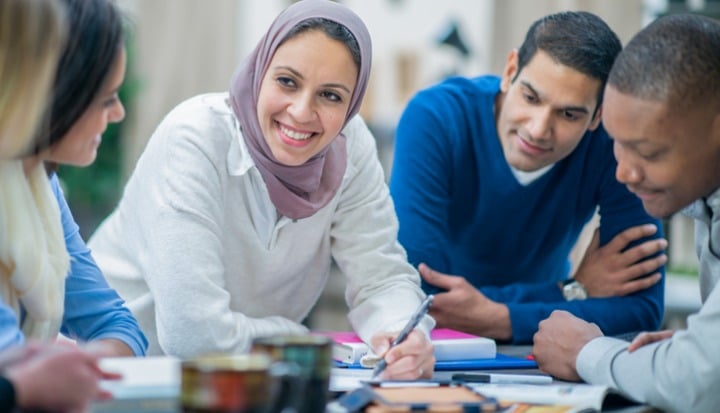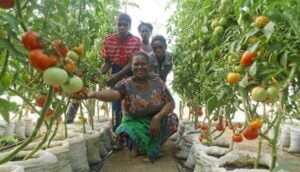Some of the best ideas and boldest actions are coming from entrepreneurs and start-ups embedded in low-income communities. These disruptors are driving innovations that are tackling environmental challenges, improving people’s health and building inclusive economies. Investing and learning from them is one of the best ways to accelerate sustainable development.
This is the purpose of TRANSFORM, a unique cross-sector collaboration that unites corporates, donors, investors and academics to support visionary enterprises across Africa, Asia and beyond. It was established in 2015 and is led by Unilever, the UK’s Foreign Commonwealth and Development Office and EY. Eight years on the initiative has reached the milestone of impacting the lives of 10 million people. To celebrate, here are 10 of the exciting innovations it has supported:
1. Recycling by bike
Social enterprise Wecyclers is tackling Nigeria’s lack of recycling infrastructure and the negative impact it has on the 70% of the country’s population living in poverty. Offering a new kind of business model, it helps people make money out of recycling via a fleet of cargo bikes – called ‘wecycles’.
Teams of collectors cycle around households, picking up recyclable waste and delivering them to sorting hubs. Service users are rewarded with points per kilogram of waste, which they can exchange for cash or essential goods, like food and household items. A win for both people and planet!
2. Giving women access to essential health items
Headquartered in Rwanda, Kasha is an online health retailer, targeted at women on low incomes. Due to the social stigma attached to buying certain health products – like contraception, sanitary pads or HIV self-test kits – women don’t want to purchase them in a shop. In rural areas, they may not even be available and ordering online isn’t possible, due to a lack of postal infrastructure.
With Kasha, women place orders at its online shop, which sells everything from soap to toilet rolls and contraceptives. The products are packaged discreetly and distributed via a network of local female agents.
3. Linking people in rural Pakistan to female doctors
In the Pakistani countryside, there are millions of people who cannot access affordable, quality healthcare – resulting in one of the highest mortality rates in South Asia. At the same time, three out of every four of the country’s medical graduates are women, but only a quarter of them go into practice, due to social and cultural constraints.
What’s the solution? Social enterprise doctHERS offers low-income people in rural areas video medical consultations with the country’s under-utilised female doctors. The doctors carry out video consultations from home, while local nurses carry out any physical tests. As many of the people living in rural Pakistan work in factories of international corporations, it’s these companies who pay for this new healthcare service for their employees and communities.
4. Creating fair and safe jobs for waste workers
Hasiru Dala Innovations offers real jobs and fair wages to India’s huge informal workforce of waste pickers, who play an essential role in supporting official waste management services by scouring the streets for plastic bottles that they sell to recycling plants.
By managing the bulk waste of apartment blocks, offering recycling teams for festivals and creating recycled plastic out of discarded bottles to sell as packaging material for consumer goods brands, the business ensures it can pay its team members enough so that all their children can finish high school. For these marginalised communities, this reliable and fair income offers a means of lifting themselves out of poverty.
5. Building female-friendly public toilets
Pristine, female-friendly public toilets are springing up all over Dhaka, the capital of Bangladesh. Run as a profitable business – thanks to the selling of advertising space and linked snack bars – these new facilities are built using a unique modular system created by Bhumijo, a social enterprise dedicated to providing hygienic public toilets and wash facilities for all.
Previously, toilets were often dirty and unsafe. In order to avoid them women and girls often restrain from drinking water when out and about. The result is a high incidence of urinary tract infections, which if left untreated can be life threatening. Thanks to Bhumijo, women can increasingly access appropriate facilities – improving their health and helping give them the freedom to take part fully in work, education and public life.
6. Combatting plastic pollution and social inequality
Taka Taka Ni Mali means ‘waste is wealth’. Helping Kenya transition to a circular economy – despite limited official recycling infrastructure – the not-for-profit organisation works to change the mindset of disadvantaged communities, so they view rubbish as a resource. Its aim is not only to combat plastic pollution but also to improve the livelihoods of waste workers.
The social enterprise has created an online platform for communication between homes and businesses, waste collectors and recycling plants. By cutting out intermediaries, those in the waste chain can earn a better income – while households benefit from a recycling collection.
7. Turning rural women into entrepreneurs
Dedicated to poverty alleviation through rural entrepreneurship, startup Dharma Life simultaneously provides women in the Indian countryside with economic opportunities and low-income households access to socially impactful products and services – from solar lighting to water purifiers.
People living in rural India face multiple developmental challenges, including a lack of internet connectivity and inadequate infrastructure in terms of basic services, like water and energy. To address these problems, Dharma Life selects and trains female entrepreneurs to sell and distribute useful products, alongside delivering behaviour change campaigns on topics like hygiene and family planning.
8. Transforming old buses into public toilets
In 2015, a women’s group won a court case against the local council in the city of Pune, in India’s Maharashtra State, for not providing enough female public toilets. There was only one toilet for every 100,000 women. In the wake of this case, local sanitation company Saraplast came up with the idea of creating female-friendly public toilets from decommissioned buses.
Now rolled out across the city, the Ti Buses – ‘ti’ means ‘her’ in Marathi – are connected to existing water and sewer services. These high quality, clean and safe toilets come complete with solar panels, panic buttons and helpful attendants.
9. Opening international markets to crafters
Powered by People is a new wholesale business-to-business online marketplace aimed at conscientious customers in developed countries. It showcases products made by sustainable small-batch makers from all over the world. These artisan crafters and makers of eco-friendly homewares, jewellery, accessories and beauty products in emerging markets usually struggle to grow their business internationally due to a lack of finance and networks.
Using tech for good to level the playing field for these makers, Powered by the People allows them to compete with much larger manufacturers of factory-made goods. With this new ability to sell to major international retailers and better access to digital tools, they can grow their business, in turn helping to support their local communities.
10. Automating waste segregation
Tech company TrashCon offers a unique innovation designed to address India’s rubbish problem and help it go zero waste. Every day, the subcontinent generates 200,000 tonnes of waste, of which 95% isn’t sorted. Food scraps, dirty nappies and sanitary waste are mixed up with plastic, metal, wood and other recyclable materials.
The TrashBot is a machine that automatically segregates rubbish into biodegradable materials – like food and garden waste – and non-biodegradable materials – including plastics and aluminium foil. These non-biodegradable materials are used to make a useful building material, not dissimilar to plywood, called WoW Boards, which can be used to make furniture, flooring and construction site shuttering.
As global inequality widens and the climate crisis escalates the next few years must be dominated by transformative action.
There’s no more time to waste. Humans have the creativity and ingenuity to meet the SDGs’ 2030 deadline – as the innovations supported by TRANSFORM demonstrate. By investing in social entrepreneurs and helping them scale up their innovative business ideas, we can learn new ways of doing things and tackle complex global problems through life-changing enterprise.










